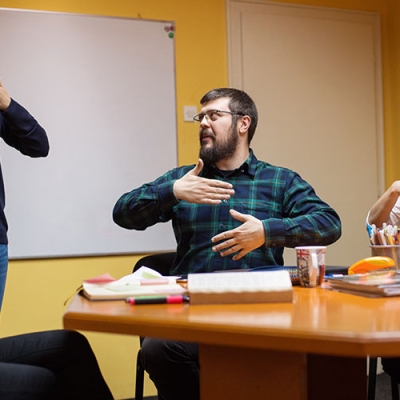Refine results
-
Complaint Information Service14 December 2012Publication
"Facilitator or Advisor?: A discussion of conciliator intervention in the resolution of disputes under Australian human rights and anti-discrimination law" (2004)
State and federal anti-discrimination & human rights law in Australia, as in many other countries2, provides for the resolution of complaints of discrimination and breaches of human rights by a process of conciliation. Conciliation is an alternative dispute resolution mechanism for parties to complaints in that it is an 'alternative' to more formal determination of the dispute by a court or… -
27 November 2015Book page
The need for better engagement - Year in review
1.1 Introduction In last year’s Social Justice and Native Title Report, I raised concerns about the changes resulting from the 2014-15 Budget and the restructure to Indigenous Affairs through the Indigenous Advancement Strategy (IAS). Despite initial concerns about how these changes would impact our communities, I indicated that the streamlining of programs and the move away from a ‘one size… -
14 December 2012Book page
Commission Website: National Inquiry into Children in Immigration Detention
The Council of Social Service of NSW (NCOSS) is an independent non-government organisation and is the peak body for the social and community services sector in NSW. NCOSS works with its members on behalf of disadvantaged people and communities towards achieving social justice in New South Wales. It was established in 1935 and is part of a national network of Councils of Social Service which… -
Commission – General14 December 2012Webpage
Australian Council of Human Rights Agencies (ACHRA) - UPR Progress Report (2011)
The Australian Government is to be commended for its frank and robust engagement in the UPR process to date, both in the formal working group session and in engaging with the Australian Human Rights Commission (AHRC), NGOs and civil society throughout the process. -
Aboriginal and Torres Strait Islander Social Justice14 December 2012Webpage
Indigenous International Rights: UN mechanisms for the recognition of Indigenous rights
UN forums and mechanisms for the recognition of indigenous human rights and International human rights standards of particular relevance to indigenous peoples -
14 December 2012Book page
Social Justice Report 2005 : Summary
The Social Justice Report 2005 covers the period from 1 July 2004 to 30 June 2005. The Report considers progress in achieving improvements in the health status of Aboriginal and Torres Strait Islander peoples and sets out a human rights framework for achieving health equality within a generation. -
14 December 2012Book page
3 Theme One - Economic Independence for Women: Listening Tour Report
I'm a mother who has been out of the paid workforce for two years and will probably be for the next 4 years, until my children are ready for pre-school. My return to work will probably be on a part-time basis and I will probably have to re-start my career after so many years out so I don't expect that I will earn very much. I never thought this would be the case - I studied for many years, earned… -
Race Discrimination30 March 2019Speech
Race Discrimination Commissioner, Mr Chin Tan, on Nelson Mandela Day
Thank you for the very kind welcome. May I extend particular thanks to the Nelson Mandela Day Commemorative Committee (NMDCC) for the invitation and for having me here this evening. Let me start by acknowledging the traditional custodians of this land where we gather tonight, the Wurundjeri people of the Kulin nation, and pay my respects to their elders past, present and emerging. I would… -
Aboriginal and Torres Strait Islander Social Justice25 March 2019Publication
UN Declaration on the Rights of Indigenous Peoples (2007)
The United Nations Declaration on the Rights of Indigenous Peoples (UNDRIP) was adopted by the General Assembly on Thursday, 13 September 2007. The Declaration is the most comprehensive international instrument on the rights of Indigenous peoples. -
22 July 2013Book page
Chapter 8: Midshipmen and Cadets are Young People and Future Leaders (Recommendations 16-18)
Key findings of Review Given their age, most undergraduates enter ADFA without much ‘real world’ experience, with many having never lived away from home before. 1 The differing levels of maturity of undergraduates, combined with the pressures of living, working and studying together, can present substantial risk factors for ADFA. In particular, the Review findings indicated that: A number of… -
14 December 2012Book page
DIAC Response to the Australian Human Rights Commission’s 2009 Immigration Detention and Offshore Processing on Christmas Island Report
The Department of Immigration and Citizenship (DIAC) welcomes the opportunity to respond to the Australian Human Rights Commission (the Commission) report on Immigration detention and offshore processing on Christmas Island following its visit to Christmas Island in July 2009. -
14 December 2012Book page
Chapter 1: A cause for cautious optimism: The year in review - Social Justice Report 2011
As I reflect on the events that have taken place during the reporting period from 1 July 2010 to 30 June 2011, I see cause for optimism whilst also acknowledging there are still some areas that remain a concern. Over the last year we have reached some major milestones. For instance, we have seen the election of the two co-chairs and a board to the National Congress of Australia’s First… -
Rights and Freedoms11 September 2020Submission
Review of Australian Federal Police Powers (2020)
The Australian Human Rights Commission (the Commission) makes this submission to the Parliamentary Joint Committee on Intelligence and Security (PJCIS) in relation to its ‘Review of AFP Powers’. -
14 December 2012Book page
Social Justice Report 1998 : Chapter 1: The Aftermath for Indigenous Peoples
It has been worth it because the wider community is more aware of the issues and our history, but the opening of the old scars has been difficult. It's vital that the truth comes out, though. -
14 December 2012Book page
15. Religion, Culture & Language for Children in Immigration Detention
The Convention on the Rights of the Child (CRC) requires Australia to protect children's rights to cultural identity, language and religion. The most effective way of ensuring enjoyment of these rights is to encourage and allow refugee and asylum-seeking children to participate in cultural and religious activities in the community. The Australian community is well equipped to respond to this need… -
14 December 2012Book page
HREOC - Annual Report 2001 - 2002: Chapter 1: The Commission
The Commission is a national independent statutory body established under the Human Rights and Equal Opportunity Commission Act 1986. It has a President and five Commissioners. The five positions are currently held by three persons. -
Disability Rights24 April 2024Webpage

Creating accessible and inclusive communications
Learn about employees with disability’s communication needs, from inclusive language, to accessible meetings and materials. -
14 December 2012Book page
Native Title Report 2007: Chapter 11
While the native title system is able to deliver social and cultural outcomes through determinations of native title, Indigenous land use agreements (ILUAs) are one of the only ways in which native title holders can pursue economic development. -
Rights and Freedoms22 July 2019Project

Free and Equal Conference
The Free and Equal conference was the centrepiece of a national conversation and once-in-a-decade event. The conference was held at the Hyatt Regency Sydney on Tuesday 8 October 2019. -
14 December 2012Book page
Appendices: African Australians - Compendium (2010)
A task of this magnitude and complexity can only be successfully accomplished by the invaluable contributions of people with a wide array of expertise and skills.
